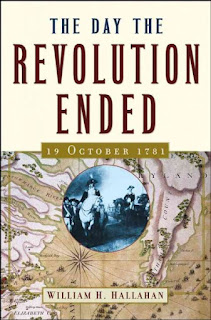.jpeg) After reading The Day the Revolution Ended: 19 October 1781 by William H. Hallahan, I am left with the impression that the American colonists were always a long shot to win their revolution. With strong leadership, the British military should have mopped up the remnants of the hastily formed rebellion on several occasions. The rebels were short of funds, clothing, and ammunition. Their ranks were reduced by disease and the annual needs of soldier farmers to get back to sow and harvest crops. Why did the British not finish them off?
After reading The Day the Revolution Ended: 19 October 1781 by William H. Hallahan, I am left with the impression that the American colonists were always a long shot to win their revolution. With strong leadership, the British military should have mopped up the remnants of the hastily formed rebellion on several occasions. The rebels were short of funds, clothing, and ammunition. Their ranks were reduced by disease and the annual needs of soldier farmers to get back to sow and harvest crops. Why did the British not finish them off?Historian and novelist Hallahan tells in great detail how many British officers and soldiers profited from their occupation of cities and campaigns through the various states. Why rush the war? While in New York, many officers under General Clinton took over great houses in the city, living lavishly in some and renting out others as barracks for their own men, pocketing the rent. These same officers shipped furniture and books taken from these homes back to their estates in Britain. Some also skimmed from the payrolls of their own troops. During campaigns chasing rebel forces, they loaded wagons full of goods to sell or keep. After defecting the colonial cause, General Benedict Arnold was openly joyous about the profit he would make marching through the rich plantations of Virginia.
This corruption in the British military contributed to its eventual demise, as the officers and soldiers stole from loyalists as wantonly as from rebels. As the war progressed, the British found it more and more difficult to enlist more loyalists into their ranks. Of course, rebel violence against loyalists had reduced their numbers, too. Hallahan is also very critical of most colonial political leaders, especially the Continental Congress, which he claims usually did nothing other than debate issues, leaving the army underfunded. He especially rebukes Virginia Governor Thomas Jefferson for doing little to prepare his state for invasion and Boston's Samuel Adams for opposing any measure to strengthen the national government. The only heroes in the narrative are Generals Washington, Lafayette, and Greene.
A better title for the book would have been The Year the Revolution Ended, as Hallahan chronicles how the American, British, and French forces all arrived at the Yorktown battlefield, a long process that seemed to develop in slow motion. It is a good story that Hallahan tells well from his point of view. We should be eternally grateful to the French, who were really there to oppose the British.
I like the Afterward which reports what happened to each of the principal characters after the war.
Hallahan, William H. The Day the Revolution Ended: 19 October 1781. John Wiley & Sons, 2004. 292p. ISBN 0471262404.



2 comments:
Thanks, yet again! This looks terrific.... birthday wishlist awaits :) The last thing I read of the period was "The Radicalism of the American Revolution" but that's been almost 20 years ago. Cool
I hope the birthday isn't far off.
Post a Comment